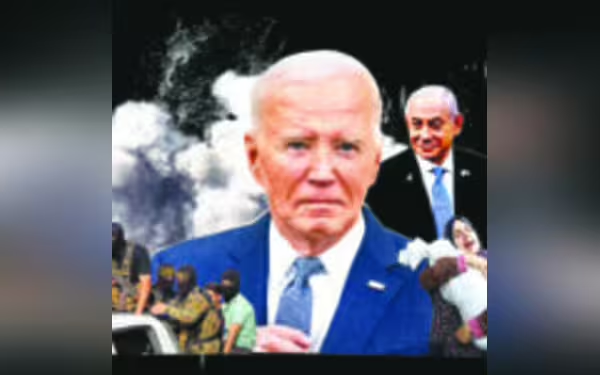Tuesday, December 24, 2024 01:37 PM
Biden's Complicity in Gaza Conflict
- Biden's policies raise questions of complicity in Gaza violence.
- Humanitarian crisis worsens despite U.S. warnings to Israel.
- International Criminal Court issues warrants against Israeli leaders.
 Image Credits: pakistantoday
Image Credits: pakistantodayBiden's administration faces criticism for complicity in Gaza violence amid worsening humanitarian crisis.
The ongoing conflict in Gaza has drawn significant international attention, particularly regarding the role of the United States under President Joseph Biden. As the situation escalates, many observers are questioning the effectiveness and moral implications of Biden's policies towards Israel and Palestine. The recent events have led to a growing perception that Biden's administration has not only failed to protect civilians in Gaza but may also be complicit in the violence.
In April 2023, President Biden communicated with Israeli Prime Minister Benjamin Netanyahu, suggesting that future U.S. support for Israel would depend on how Israel treats civilians in Gaza. This statement was seen as a potential turning point, where Biden appeared to leverage U.S. aid to influence Israel's actions. However, despite this warning, the humanitarian crisis in Gaza has only worsened. Reports indicate that thousands of Palestinians have lost their lives in schools, hospitals, and mosques, places where they sought refuge from the violence.
As the months passed, the Biden administration's threats seemed to have little impact. In October, Secretary of State Antony Blinken and Secretary of Defense Lloyd Austin expressed their concerns about the dire humanitarian situation in Gaza, giving Israel a 30-day ultimatum to improve conditions. Yet, as the deadline approached, the situation continued to deteriorate, with aid groups reporting severe shortages of food, water, and medical supplies.
On November 12, the U.S. administration issued a statement praising Israel for its "improvements" in Gaza, despite overwhelming evidence to the contrary. Just days later, the U.S. vetoed a United Nations Security Council resolution aimed at establishing a ceasefire, citing the need for the immediate release of Israeli hostages. This reasoning was criticized as misleading, as the resolution had already called for a ceasefire and the release of all hostages.
Furthermore, the U.S. Senate faced pressure regarding arms sales to Israel, with some senators arguing that these shipments violated U.S. laws designed to protect civilians. The White House responded with talking points that dismissed these concerns, suggesting that disapproving arms sales would benefit groups like Iran and Hamas. This tactic of "Hamas-baiting" raised eyebrows, as it seemed to undermine the serious allegations against Israel.
In a striking development, the International Criminal Court issued arrest warrants for Israeli leaders, accusing them of serious crimes against the civilian population in Gaza. President Biden's response was to denounce these warrants, reaffirming U.S. support for Israel. This reaction has led many to believe that Biden is unwilling to change his stance, even in the face of mounting evidence of human rights violations.
As President Biden approaches the end of his term, it appears he will leave office without making significant changes to U.S. policy regarding Israel and Palestine. His administration's actions—or lack thereof—have led to a legacy that many will view as one of complicity in the ongoing violence. The question remains: will future leaders learn from these events, or will history repeat itself?
The situation in Gaza is a complex and tragic chapter in international relations. The humanitarian crisis continues to unfold, and the world watches closely as the U.S. navigates its role in this conflict. It is crucial for leaders to prioritize human rights and the protection of civilians, ensuring that history remembers their actions as those of compassion and justice, rather than complicity in violence.













